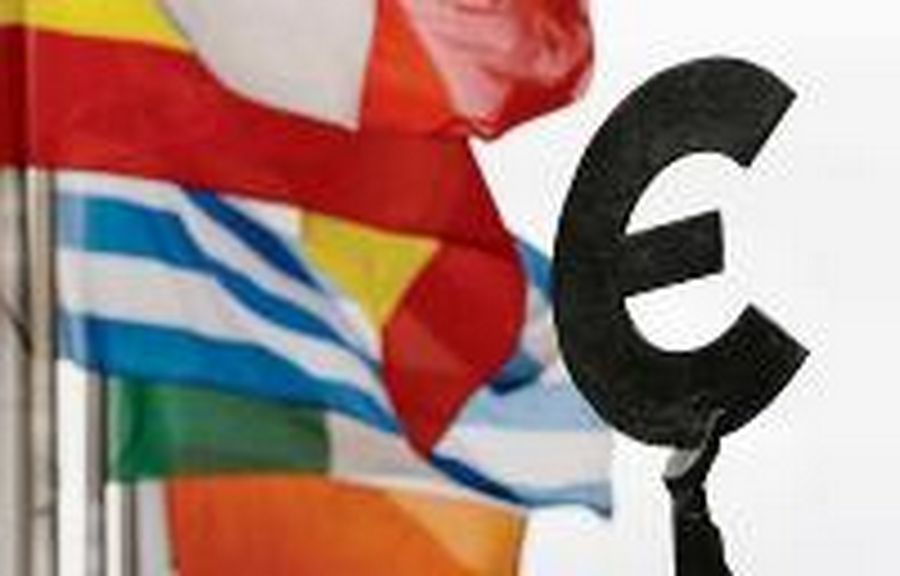
Greek and others European national flags flutter near an euro symbol outside the EU Parliament in Brussels August 30, 2011. (REUTERS/Francois Lenoir)
In some ways it was inevitable, sensible even, but the fact that the EFSF decided to hold fire on its latest €3bn 10-year bond was the result of more than just market volatility.
True, the markets were treacherous, although that didn’t stop Rabobank from pricing a US$2bn perpetual hybrid on the same day the EFSF was slated to come.
By its very nature, the EFSF’s fortunes are intertwined with the European sovereign crisis. And as the crisis has deepened and various resolutions have been contemplated, so has confusion over exactly what the facility is and how it will operate.
From a simple disburser of funds, it has seen its size grow and has also added the power to intervene in both primary and secondary markets. Now there is talk of leverage that could see it morph into some kind of monoline insurance vehicle or CDO. And all the while, the macroeconomic themes are playing in the background.
Small wonder, then, that some investors are saying they simply don’t know what it is – or will become – and would therefore rather not get involved, thank you very much.
Faced with credit risk that has political and structural risk layered on top of it, potential buyers are now being far more cautious than in the halcyon days of January when demand for the EFSF’s first bond was such that even a minimal fill was greeted with unbounded joy.
The EFSF will come back to the market – and soon – and there will doubtless be sufficient investors to satisfy its needs. But prolonged uncertainty over exactly what it is, what it does and how it does it cannot be good for anyone.
How’s that for a deal?
Groupon’s US$700m IPO not only marked the dawn of a new era for the daily-deal provider but, in many ways, for the US equity capital markets as well.
The transaction was notable for the participation of two mutual fund companies that had made earlier pre-IPO investments into the company and took more stock through the IPO.
Fidelity Investments and T Rowe Price have already seen a tripling in the value of their initial investment made less than a year ago – that is alpha – and no doubt received plum allocations on the IPO for their loyalty.
Combine that with the fact that, at 5.5% of the outstanding, the float was already bordering on too small to allow for a sensible market and the deal raises questions about what constitutes a fair free-float and about the distinction between private and public markets.
Such issues will become increasingly acute as more mutual fund investors take positions both before and after IPOs and leave too little stock changing hands to provide proper market prices.
Of course, all that will matter little to Groupon and Andrew Mason, the company’s 31-year old CEO. Given the torrent of criticism that shadowed the transaction, the Groupon IPO is a remarkable success for the banks involved and will provide a trigger point for a rebound in the US IPO market.
What’s stopping you?
It’s not like investment banks to let an opportunity to make a quick buck go begging. So why then the (professed) reluctance to quote credit default swaps referencing the European Financial Stability Fund?
Yes, perhaps the cash market for these bonds is still a tad too illiquid. But such quibbles have hardly stopped dealers from creating CDS in the past.
And anyway, as any trader will gladly tell you, the creation of a stable and liquid CDS market is beneficial to the underlying cash market, as it allows bondholders to hedge their positions, making investors more likely to buy the bonds in the first place.
Surely, then, EFSF CDS would boost demand for the bonds (which, incidentally, need a bit of help, given the pulled 10-year deal last week).
If they believe their own arguments, it is banks’ civic duty to provide this protection to investors. Those that have been brave enough to sell this CDS should be proud, rather than furiously trying to cover their tracks.
Take it like a man
Jon Corzine, sensing an opportunity to expand when others were contracting, levered up the balance sheet of sleepy MF Global in an effort to turn it into a mini Goldman Sachs.
But instead of turning MF Global into a mini Goldman he turned it into a mini Lehman Brothers – more Dick Fuld than Lloyd Blankfein.
Corzine has already begun to paint a narrative that it wasn’t his fault. “I feel great sadness for what has transpired at MF Global,” he said in his farewell statement.
Bankers, especially senior ones, like to think of themselves as macho, rugged buccaneers. Until things go wrong, that is, when all too many adopt the passive voice beloved of slippery politicians and do their best to walk away without any blame – just a huge pay-off.
How much more edifying it wouldbe were they to take responsibility for their mistakes.
